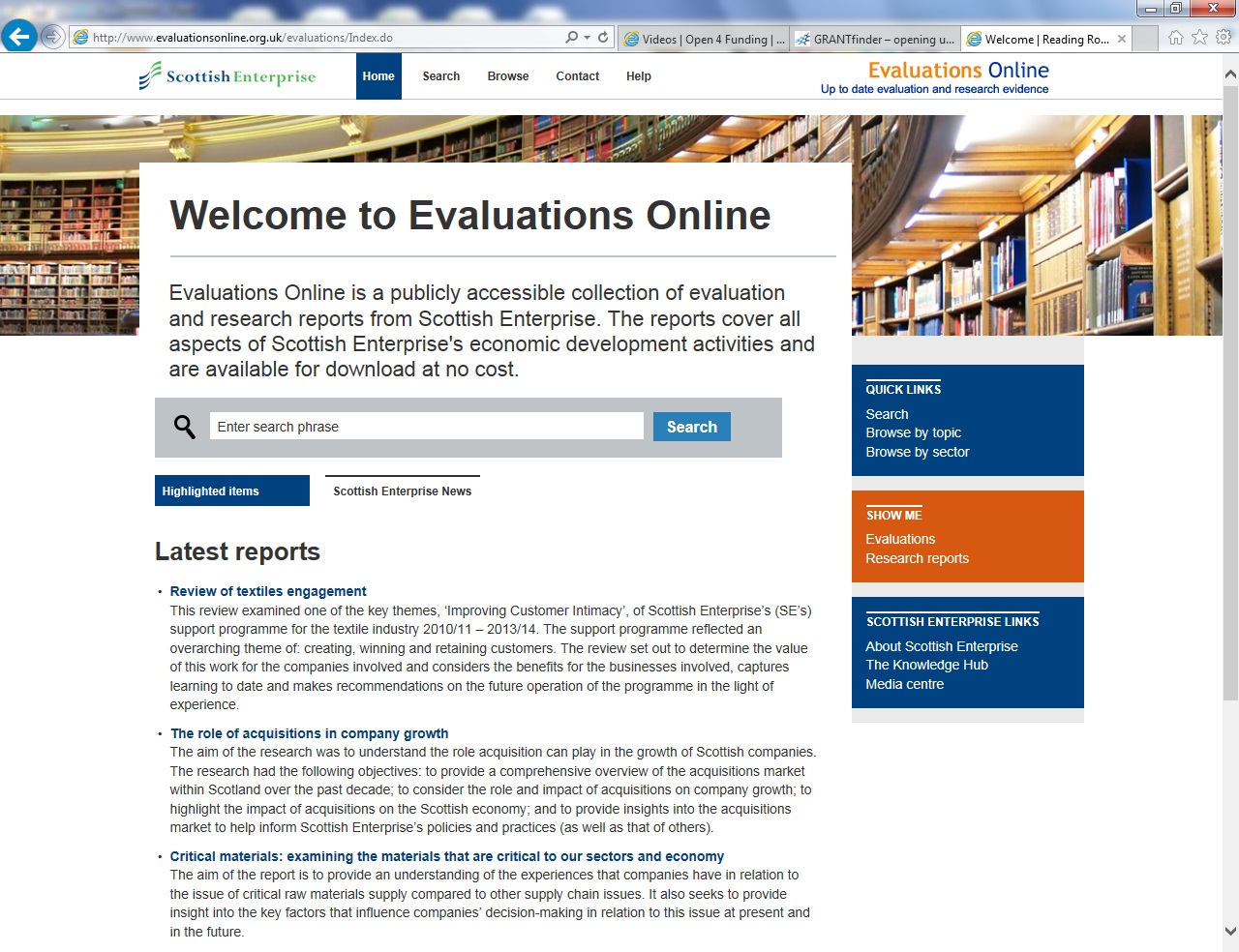By Stephen Lochore
 The Knowledge Exchange has helped a range of public sector organisations to collate, analyse and disseminate their evaluation and research material. One example is the Evaluations Online portal, a publicly accessible collection of evaluation and research reports from Scottish Enterprise, one of Scotland’s two regional development agencies. We’ve recently made some changes to the portal, and though these were mainly to design and layout, it got me (as Project Manager) thinking about wider issues of accountability and evidence-based policy.
The Knowledge Exchange has helped a range of public sector organisations to collate, analyse and disseminate their evaluation and research material. One example is the Evaluations Online portal, a publicly accessible collection of evaluation and research reports from Scottish Enterprise, one of Scotland’s two regional development agencies. We’ve recently made some changes to the portal, and though these were mainly to design and layout, it got me (as Project Manager) thinking about wider issues of accountability and evidence-based policy.
Scottish Enterprise commissioned Idox to build Evaluations Online because it wanted a focused approach for disseminating specialist economic development evaluation and research resources. We created tools and functions tailored to the content and intended audience of economic development policy-makers and practitioners. Scottish Enterprise wants other organisations to learn from its activities – including its approach to evaluation and appraisal. We’ve tried to make it easy for the portal’s users to find relevant material, for example by providing a way to browse the collection, and providing a summary of each report to highlight the most important findings and implications.
My presentation at the 2013 UK Evaluation Society conference outlined four aspects of the ‘lifecycle’ of evidence: planning, activity/delivery, knowledge sharing and reviewing your approach.
Knowledge sharing has often been the ‘poor relation’, particularly compared to the effort and expense that public bodies commit to carrying out research, evaluation, monitoring and appraisal. Recent initiatives such as the What Works evidence centres for social policy are encouraging – we attended the launch of What Works Scotland in June 2014 – but to be successful they will need to engage those who develop and deliver public policy so that decisions are informed by what has been proved to work elsewhere.
Repositories of evidence can help bring about better policy in a number of ways:
- Improve accountability by making it easier for people to scrutinise the activities and spending of public sector organisations – this helps organisations meet Freedom of Information responsibilities;
- Improve the visibility and therefore the impact of evidence;
- Help identify gaps in evidence by making it easier to compare research findings;
- Increase our understanding of what works (‘good practice’) not only in the activities covered, but also in evaluation and research methods.
Scottish Enterprise believes Evaluations Online increases the return on its evaluation and appraisal activities. Generally speaking, the costs of collecting, analysing and curating outputs are relatively minor compared with those of carrying out research and evaluation, which in turn are dwarfed by the costs of implementing policy. We need to address all aspects of our approach to evidence to systematically improve the way we design and deliver services.
I believe we need to improve the way we share knowledge if we are to implement evidence-based policy. It’s the only sustainable basis for efficient services. Evidence repositories such as Evaluations Online are a small part of how we can achieve that.
Share
Related Posts
A recent item on BBC Radio 4’s Today programme generated an unusually high number of responses from listeners. A man who had lost his job in the financial services sector at the age of 57 described his difficulty in trying ....
Tackling geographical inequalities is critical for ensuring that all parts of the country have the potential to prosper. When the UK was a member of the European Union, it was entitled to a share of funding from the EU’s structural ....
By Robert Kelk and Chris Drake A new start for an old challenge? The recent appointment of Marc Lemaître as the European Commission’s director general for research and innovation (R&I) has returned Europe’s R&I gap to the spotlight. Previously head ....
Across the world, two disruptive and powerful trends are taking hold: digitalisation and decarbonisation. At times, it seems as if these two forces are acting against each other, with digital technologies accelerating economic growth, but also consuming huge quantities of ....
